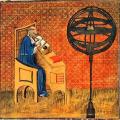278. Sara Uckelman on Obligations
Posted on
Sara Uckelman soundly defeats Peter in the medieval logical game of "obligations."
Themes:
Further Reading
• S.L. Uckelman, “Deceit and Indefeasible Knowledge: The Case of Dubitatio,” Journal of Applied Non-Classical Logics 21 (2011): 503-19.
• S.L. Uckelman, “Interactive logic in the Middle Ages,” Logic and Logical Philosophy 21 (2012): 439-71.
• S.L. Uckelman, “Medieval Disputationes de obligationibus as formal dialogue systems,” Argumentation 27 (2013), 143-66.
• S.L. Uckelman, “Sit Verum Obligationes and Counterfactual Reasoning,” Vivarium 53 (2015), 90-113.
• C. Dutilh Novaes and S.L. Uckelman, “Obligationes,” in C. Dutilh Novaes and S. Read (eds), Cambridge Companion to Medieval Logic (Cambridge: 2016), 370-95.







Comments
obligations and the ādāb al-baḥth
This was a wonderful introduction to the "obligations" for me, thank you both. A very different, gymnastic disputation theory as compared to the more straight-up dialectic of the ādāb al-baḥth as it was developing around the same time (14th century), but with so many points of overlap. And the variant games of the obligations would have developed skills immediately applicable to disputations governed by the ādāb al-baḥth. A comparative study of the two traditions (once sufficient analytical studies have been made of their huge bodies of treatises and commentaries--only just beginning for the ādāb al-baḥth), would be richly rewarding for scholars of both, I imagine. Something for the to-do list! :)
In reply to obligations and the ādāb al-baḥth by Walter Young
Parallels
Yes, great point. I have actually been doing research on 12-13th century Islamic thought while doing these episodes on Latin scholasticism and have been very struck by the many parallels; I am thinking of writing a paper on it. Of course the most important commonality is that Avicenna is a crucial influence in both spheres.
but...but...
You guys didn't play a game! So disappointing. I wanted to hear an example of losing track of what you've established, like she mentioned happened to her!
I was totally fascinated by how the order of the assertions alters the correct answer (which convinced me, though I am not a philosopher and really have no idea, that she's on to something with this "dynamic logic" thing) and how counterfactuals don't work in 'classic' obligations but do in the other variety....great stuff.
In reply to but...but... by Taxi
Playing the game
Well, she did take me through a couple of rounds of the game, twice, in the interview (if I remember rightly). Maybe you feel like we didn't play it properly because I already got lost after two or three steps? By the way I wasn't expecting her to do that, so it was not rehearsed in advance!
I agree about the dynamic logic business - so interesting!
The game
Very fun episode, it really made me want to try out the game. What a shame that the algorithm your guest mentioned is no longer public, that sounds absolutely brilliant!
In reply to The game by Zarl
Game of Drones
That does sound like fun, but perhaps more exciting to play with a human opponent - a bit more finesse involved?
I think it was Schiller who said, "Man only plays when in the full meaning of the word he is a man, and he is only completely a man when he plays." Or maybe it was Huizinga. I have a horrible memory for details and would undoubtedly swiftly be foiled in any (s)word play bout!
Necessity/Genus
Does what is necessary in nature follow the posito? Or just what is logically necessary. For example:
"you are a penguin" = true
" you are a bird" = ?
Now by logical necessity, I haven't established that penguines are birds, so it would be irrelevant. Thus i would answer false, and then it would logically follow that Penguines are not birds.
But by natural necessity, penguins need to be birds to be a penguin. Therefore I would answer true.
Either way allows truely irrelivant propositions (like you are in rome) to create further false statements using Or statements. However, natural necessity seems to make more sense for a medieval gameplay example. But it also is more likely to spark disputes on if something necessarily follows or not. (like "You are a professor" would spark controversy on if being a human (and therefore not being a penguin) is a necessary requirement of being a professor?)
In reply to Necessity/Genus by Alexander Johnson
Types of necessity
That's an interesting question; I suspect that they did not distinguish sharply between these kinds of necessity but I will see if Sara can enlighten us.
Let it be true that Antichrist exists...
Great interview! (And cool game actually!)
I was a bit puzzled by something that is not directly... relevant to the subject: You mention "Antichrist exists" as an example of a false proposition, on the same level as "Socrates is a donkey". Was this an actual example used in Medieval Europe? But it seems to have been a common belief back then that the Antichrist would come up some day or other (after all, Luther's idea that the pope is the Antichrist didn't appear out of thin air). So, if medieval logicians take this to be a false proposition, even an obviously false one: would they mean that Antichrist (obviously) doesn't exist YET (because, say, there is no general persecution of Christianity yet)? Or would they actually consider the belief in Antichrist to be a superstition of the common people, which the enlightened elite of the universities obviously rejects?
Looking forward to be freed from my "dubitations" by a relevant answer...
In reply to Let it be true that Antichrist exists... by S.G.
Antichrist
Oh, good question. I'm guessing here but I suspect the assumption means "he is here now already," as you suggest. Which is clearly false because if it was time for the Antichrist to show up we would definitely know about it.
Play obligation!
I was fascinated by the description of the game and create a version to play against the computer. Having it, I figured I should share it with whomever might be interested. It is, I hope, not too much of a distortion of the historical game. The version I posted is for Android and you can get it here.
https://play.google.com/store/apps/details?id=net.oldtimebaseball.disputation
I'm happy to share the source code with anyone who cares to have it. A command line version (for Java) is here.
https://github.com/smiz/logic
This same game (minus test cases, etc and stripped clean for distribution) for Android is here
https://github.com/smiz/Disputation
In reply to Play obligation! by Jim Nutaro
Disputation
Wow neat! I'll pass that on to Prof Uckelman.
Add new comment